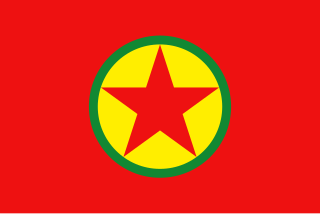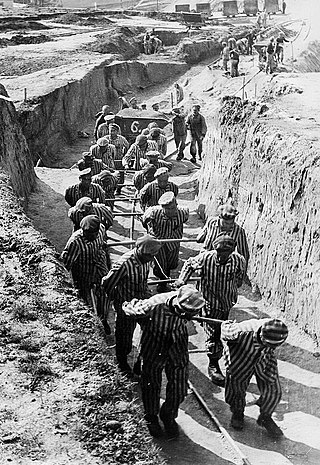Related Research Articles
Democrat, Democrats, or Democratic may refer to:

Heinrich Luitpold Himmler was a German politician who was the 4th Reichsführer of the Schutzstaffel, a leading member of the German Nazi Party, and one of the most powerful men in Nazi Germany. He is primarily known for being a principal architect of the Holocaust.

The Schutzstaffel was a major paramilitary organisation under Adolf Hitler and the Nazi Party in Nazi Germany, and later throughout German-occupied Europe during World War II.

The Kurdistan Workers' Party or PKK is a Kurdish militant political organization and armed guerrilla movement which historically operated throughout Kurdistan but is now primarily based in the mountainous Kurdish-majority regions of southeastern Turkey and northern Iraq. Since 1984, the PKK has been involved in asymmetric warfare in the Kurdish–Turkish conflict. Although the PKK initially sought an independent Kurdish state, in the 1990s its official platform changed to seeking autonomy and increased political and cultural rights for Kurds within Turkey.
A by-election, also known as a special election in the United States and the Philippines, and a bye-election or a bypoll in India, is an election used to fill an office that has become vacant between general elections.

The Donner Party, sometimes called the Donner–Reed Party, were a group of American pioneers who migrated to California in a wagon train from the Midwest. Delayed by a multitude of mishaps, they spent the winter of 1846–1847 snowbound in the Sierra Nevada. Some of the migrants resorted to cannibalism to survive, mainly eating the bodies of those who had succumbed to starvation, sickness, or extreme cold, but in one case two Native American guides were murdered and eaten.
Parliamentary opposition is a form of political opposition to a designated government, particularly in a Westminster-based parliamentary system. This article uses the term government as it is used in Parliamentary systems, i.e. meaning the administration or the cabinet rather than the state. In some countries, the title of "Official Opposition" is conferred upon the largest political party sitting in opposition in the legislature, with said party's leader being accorded the title "Leader of the Opposition".

The Bahujan Samaj Party is a political party in India that was formed to represent Bahujans, referring to Scheduled Castes, Scheduled Tribes, and Other Backward Classes (OBC), along with religious minorities. According to Kanshi Ram, when he founded the party in 1984, the Bahujans comprised 85 percent of India's population, but were divided into 6,000 different castes. The party claims to be inspired by the philosophy of B. R. Ambedkar, Jyotiba Phule, Narayana Guru, Chhatrapati Shahuji Maharaj, and Gautama Buddha.

From 1933 to 1945, Nazi Germany operated more than a thousand concentration camps, including subcamps on its own territory and in parts of German-occupied Europe.

National Democracy was a Polish political movement active from the second half of the 19th century under the foreign partitions of the country until the end of the Second Polish Republic. It ceased to exist after the German–Soviet invasion of Poland of 1939.
This is a list of words, terms, concepts and slogans of Nazi Germany used in the historiography covering the Nazi regime. Some words were coined by Adolf Hitler and other Nazi Party members. Other words and concepts were borrowed and appropriated, and other terms were already in use during the Weimar Republic. Finally, some are taken from Germany's cultural tradition.

The Amal Movement is a Lebanese political party and former militia affiliated mainly with the Shia community of Lebanon. It was founded by Musa al-Sadr and Hussein el-Husseini in 1974 as the "Movement of the Deprived." The party has been led by Nabih Berri since 1980. The Greek Catholic Archbishop of Beirut, Grégoire Haddad, as well as Mostafa Chamran, were among the founders of the movement.

The pro-democracy camp, also known as the pan-democracy camp, is a political alignment in Hong Kong that supports increased democracy, namely the universal suffrage of the Chief Executive and the Legislative Council as given by the Basic Law under the "One Country, Two Systems" framework.

German-occupied Europe refers to the sovereign countries of Europe which were wholly or partly militarily occupied and civil-occupied, including puppet governments, by the military forces and the government of Nazi Germany at various times between 1939 and 1945, during World War II, administered by the Nazi regime under the dictatorship of Adolf Hitler.

The pro-Beijing camp, pro-establishment camp or pro-China camp is a political alignment in Hong Kong which generally supports the policies of the Beijing central government and the Chinese Communist Party (CCP) towards Hong Kong. The term "pro-establishment camp" is regularly in use to label the broader segment of the Hong Kong political arena which has the closer relationship with the establishment, namely the governments of the People's Republic of China (PRC) and the Hong Kong Special Administrative Region (HKSAR). Pro-Beijing politicians are labeled "patriots" by pro-Beijing media and "loyalists" by the rival pro-democracy camp.

Amon Leopold Göth was an Austrian SS functionary and war criminal. He served as the commandant of the Kraków-Płaszów concentration camp in Płaszów in German-occupied Poland for most of the camp's existence during World War II.

The 2011 Hong Kong District Council elections were held on 6 November 2011. Elections were held to all 18 District Councils of Hong Kong, returning 412 members from directly elected constituencies, each selecting a council member. After the government's constitutional reform package was passed in 2010, five new seats in the Legislative Council would be created in which the candidates would be nominated by all District Councillors.

The 1999 Hong Kong District Council elections were held on 28 November 1999 for all 18 districts of Hong Kong, for 390 members from directly elected constituencies out of total 519 council members. It was the first District Council election after the handover of Hong Kong in 1997, replacing the existing Provisional District Councils appointed by Chief Executive Tung Chee-hwa.
The third camp, also known as third camp socialism or third camp Trotskyism, is a branch of socialism that aims to oppose both capitalism and Stalinism by supporting the organised working class as a "third camp".